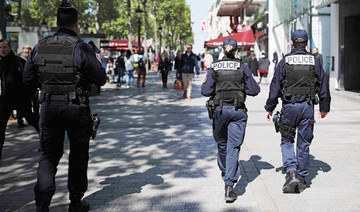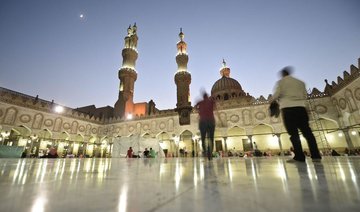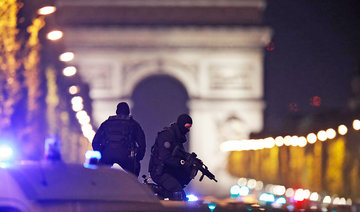PARIS: Two French officials say the gunman who shot and killed a police officer on the Champs-Elysees was detained in February for threatening police then freed.
The officials spoke Friday to The Associated Press on condition of anonymity because they weren’t authorized to publicly discuss details of the probe into Thursday night’s attack.
The officials said the gunman was detained toward the end of February after speaking threateningly about the police but then released for lack of evidence.
He was convicted in 2003 of attempted homicide in shootings on two police officers.
Police shot and killed the gunman after he opened fire on a police van on Paris’ most famous boulevard. The Daesh group quickly claimed responsibility for the attack.
Far-left presidential candidate Philippe Poutou is blaming French politics for the deadly attack on Paris’ Champs-Elysees, in which a police officer and the attacker were killed.
Poutou, a car-factory worker backed by anti-capitalist party NPA, says the roots of extremist attacks are neither in mosques nor migrant camps. He said: “They are in the situation of external and internal war maintained by the state, and in the injustice and discriminations maintained in the suburbs.”
Poutou says the French state has to share the blame for attacks because it discriminates against people living in impoverished suburbs because of “their skin color or origins,” takes military action in Africa and the Middle East and sells arms to dictatorships.
The Belgian man who had been linked by some as an accomplice to the Paris terror attack turned himself in, but authorities said there was no link.
A prosecutor in Belgium’s Antwerp said: “That man came to police late yesterday after he saw himself appear on social media as terror suspect No. 1 relating to yesterday’s facts.”
The prosecutor, who declined to be identified because the investigation was ongoing, said the man had nothing to do with the attack. “He was not part of a terrorism investigation.”
Belgian Justice Minister Koen Geens told VRT network early Friday that “at this moment we have no information about Belgian links.”
The Paris prosecutors’ office leading the investigation into the Champs-Elysees gun attack says police have detained for questioning three family members of the suspected gunman, who was shot and killed.
The prosecutors’ office stressed Friday that questioning family members is routine in such cases, as investigators seek to determine whether the gunman was acting alone, where he got his weapons and other details.
The Daesh group quickly claimed responsibility for the attack that killed one police officers and injured two others on the iconic Parisian boulevard Thursday night.
Far-right French populist leader Marine Le Pen is calling for “a clear head and a firm grip” in the wake of the Champs-Elysees gun attack that put the focus back on one of the main themes of her election campaign for the French presidency: France’s fight against Islamic extremism.
Speaking Friday morning on RFI radio, Le Pen said: “It is time to stop being naive.”
One of the key questions heading into Sunday’s first-round vote is whether the attack Thursday night that killed a police officer and injured two others could bump up the vote for her program of stepped-up security and border controls, more resources for police and tougher treatment of radicals listed on the government’s database of people regarded as potential threats to national security.
Parisian commuters and tourists are walking warily past police tape around the Champs-Elysees after an attack that some say may push voters to favor far-right presidential candidate Marine Le Pen.
Police and soldiers are stationed at multiple sites around the broad, cobblestoned avenue Friday morning.
Retiree Elena Worms, walking her dog near the Champs-Elysees, called the attack “destabilizing” and said she fears it will “push people to the extremes” in Sunday’s presidential election.
However she said she will not change her vote — she plans to support conservative Francois Fillon, who takes a tough line on security and what he calls Islamic totalitarianism.
Marty Cisse, an office cleaner from Mauritania, worries that Le Pen’s closed-borders platform would threaten immigrants like himself, but said “security is important” and said it should be the priority of the next president.
The Paris prosecutor’s office leading the investigation of the Champs-Elysees gun attack says investigators found a pump-action shotgun and knives in the gunman’s car.
Police quickly shot and killed the gunman after he opened fire on officers, killing one and injuring two others on Thursday night.
The Daesh group claimed responsibility.
France’s government has reviewed its already extensive election security measures and says it is “fully mobilized” in the wake of the Champs-Elysees gun attack on police officers.
Speaking after a meeting Friday morning of the government’s security council, Prime Minister Bernard Cazeneuve said: “Barbarity and cowardice struck Paris last night, as they also recently struck elsewhere in Europe — in Berlin, Stockholm, in London.”
He said “the whole of Europe is targeted because it represents the values and ideals of peace.”
He said more than 50,000 police and gendarmes are mobilized to protect Sunday’s first-round vote in the two-stage election, with an additional 7,000 soldiers also on patrol. He added that the intelligence services are working “in the shadows” and elite intervention police forces are also on alert.
He said “nothing must hamper this democratic moment, essential for our country.”
The prime minister appealed for national unity and for people “not to succumb to fear.”
Presidential candidate Emmanuel Macron is appealing to French voters to keep a cool head in the wake of the gun attack of the Champs-Elysees that killed a police officer.
Speaking Friday on RTL radio, Macron said: “What our attackers want is death, symbolism, to sow panic (and) to disturb a democratic process, which is the presidential election.”
The centrist who has been a front-runner in polls with Marine Le Pen of the far-right National Front said he has canceled two planned campaign stops on Friday out of a sense to “decency” and to allow police to concentrate resources on the attack investigation.
Asked if the assault would impact voting on Sunday, Macron said: “No one knows.”
He vowed that, if elected, he would within weeks of taking power create a task force to coordinate French intelligence efforts against the Daesh group, which claimed responsibility for Thursday night’s attack.
He tore into Le Pen, accusing her of lying with claims that previous attacks wouldn’t have happened under her watch.
“She won’t be able to protect our citizens,” Macron said of Le Pen.
French officials say the two police officers injured on the Champs-Elysees by a gunman who killed one of their colleagues are both out of danger.
Interior Ministry spokesman Pierre-Henry Brandet said one of the injured officers was more gravely hurt than the other but both are doing better.
National police spokesman Jerome Bonet, also speaking on BFM television, said “there were thousands of people” on the iconic boulevard in Paris when the gunman opened fire and that the rapid response of officers who shot and killed him avoided a possible “carnage.”
France began picking itself up Friday from another shooting claimed by the Daesh group, with President Francois Hollande calling together the government’s security council and his would-be successors in the presidential election campaign treading carefully before voting this weekend.
One of the key questions was if, and how, the attack that killed one police officer and wounded three other people might impact voting intentions. The risk for the main candidates was that misjudging the public mood, making an ill-perceived gesture or comment, could damage their chances. With polling just two days away, and campaigning banned from Friday at midnight, they would have no time to recover before polls open on Sunday. Candidates canceled or rescheduled final campaign events ahead of Sunday’s first-round vote in the two-stage election.



























